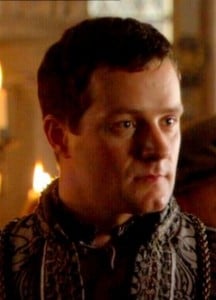 George Boleyn, Lord Rochford, was also tried today at the King’s Hall in the Tower of London. His sister, Queen Anne Boleyn, had already been found guilty of committing incest with him so there was no surprise when he was also found guilty and sentenced to death.
George Boleyn, Lord Rochford, was also tried today at the King’s Hall in the Tower of London. His sister, Queen Anne Boleyn, had already been found guilty of committing incest with him so there was no surprise when he was also found guilty and sentenced to death.
Sir Tim Ridgway has been speaking to those present a court to build up a picture of what happened at Lord Rochford’s trial which took in front of the same jury as his sister’s trial. Over to you, Sir Tim…
Thank you, Lady Claire. Well, everyone I have spoken to agrees that Lord Rochford put up a good fight in the King’s Hall today. The Boleyn siblings are highly intelligent and both, with their poetical and musical abilities, have a way with words. Charles Wriothesley told us of how Rochford pleaded not guilty and then “he made answer so prudently and wisely to all articles laid against him, that marvel it was to hear, but never would confess anything, but made himself as clear as though he had never offended”1 and Lancelot de Carles spoke of “his calm behaviour and good defence”, adding that “More [Thomas More] himself did not reply better”2. Another eye witness spoke of his eloquence and how he defended himself so well that it appeared to some that he might save himself:-
“Her brother was charged with having cohabited with her by presumption, because he had been once found a long time with her, and with certain other little follies. To all he replied so well that several of those present wagered 10 to 1 that he would be acquitted, especially as no witnesses were produced against either him or her, as it is usual to do, particularly when the accused denies the charge.”3
Another agreed, commenting that “the judges at first were of different opinions” and George Constantine, Henry Norris’s servant, said that “For there were that sayed that moch money wold haue byn layed that daye, & at great oddes, that the Lord Ratchforde shulde haue byn quytte.”4
As well as being eloquent, Lord Rochford seems to have been quite spirited in his defence. When he was given a note which contained the charge that he, his wife and the Queen had discussed the King’s sexual problems he recklessly read it aloud even though he had been warned not to5. Perhaps he felt that he had nothing to lose and everything to gain by humiliating the King, at least he could go down in a blaze of glory!
As predicted, in the end the jury were unanimous in finding him guilt and his uncle, the Duke of Norfolk, sentenced Rochford to a full traitor’s death:-
“that he should go again to prison in the Tower from whence he came, and to be drawn from the said Tower of London through the City of London to the place of execution called Tyburn, and there to be hanged, being alive cut down, and then his members cut off and his bowels taken out of his body and burnt before him, and then his head cut off, and his body to be divided into quarter pieces, and his head and body to be set at such places as the King should assign.”6
According to the Imperial ambassador, Eustace Chapuys:-
“Her brother, after his condemnation, said that since he must die, he would no longer maintain his innocence, but confessed that he had deserved death. He only begged the King that his debts, which he recounted, might be paid out of his goods.”7
I’m sure that the tabloid press will have a field day with that, twisting it to mean that Rochford was confessing to incest and treason, but we’re sure that he was simply admitting his guilt as a sinner and the fact that all of us deserve death because of our sinful natures. Let us not read too much into this remark.
We just pray now that Queen Anne Boleyn and her brother will be spared the horror of a true traitor’s death and that they will be able to die by the more merciful axe instead. It is unlikely that they will be pardoned.
Notes and Sources
- Chronicle of England during the Reigns of the Tudors, Charles Wriothesley, p39
- English Summary of the Poem on Anne composed by Lancelot de Carles in Anne Boleyn: In Her Own Words and the Words of Those Who Knew Her, Elizabeth Norton, p263
- LP x.908
- A Memorial from George Constantyne to Thomas Lord Cromwell in Anne Boleyn: In Her Own Words and the Words of Those Who Knew Her, Elizabeth Norton, p206
- LP x.908
- Hamer quoted in The Lady in the Tower, Alison Weir, p227
- LP x.908